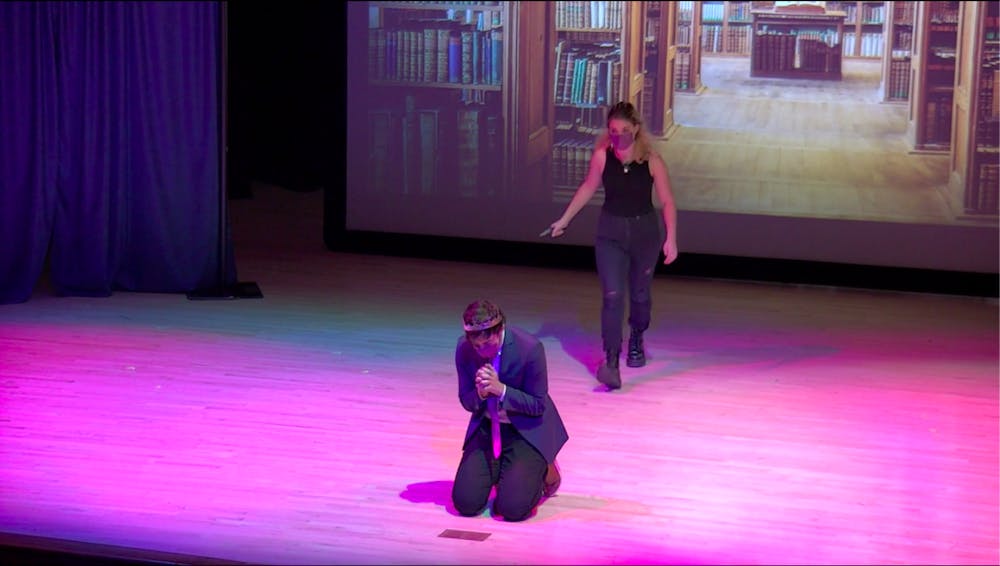Over the last weekend of October and the first weekend of November, the Barnstormers presented a rendition of Hamlet for the Fall Mainstage. It was the first live, in-person mainstage by the Barnstormers in two years and was an excellent return to the stage, making most of the Shakespearean classic while subtly bringing it to the modern age.
Hamlet, the tale of the young prince of Denmark whose struggles to avenge his father’s death end in ghastly tragedy, is not just one of the most well-known plays in English literature, it is also considered one of the greatest. Its nuanced and often unresolved explorations of themes of existentialism, mental illness and familial belonging have allowed the play to become one of Shakespeare’s most open to adaptation and reinterpretation. Yet the familiarity of audiences with the story and the length of the play (Shakespeare’s longest, by some measures) also make it a unique challenge to perform.
Producer Courtney Carreira explained that the difficulty was part of the reason why they chose the play in an interview with The News-Letter.
“In recent years, the Barnstormers have done some fairly comedic shows, but for this mainstage, we wanted to give our company and audience something thought-provoking to grapple with,” she said.
Carreira also discussed the Barnstormers’ motivation to modernize the story.
“Hamlet really felt like a show that could make an interesting commentary given the right environment,” she said. “For us, that environment was one of a modern setting and with a female Hamlet.”
Thus, the production largely stuck to the original story and dialogue (pared down to two hours from the usual four) but placed it in a contemporary landscape. For example, rather than Hamlet and Laertes sword fighting in the final scene of the play, they fought with boxing gloves instead. And Bernardo and Marcellus, rather than wearing a medieval guard’s armor, were instead wearing green collared T-shirts with “Security” emblazoned on them, which felt like a subtle, tongue-in-cheek comment on the way in which the aesthetic of security and protection is seen today.
It was particularly interesting to see how having a female Hamlet changed the nature of the story, too. Princess Hamlet, played by junior Hanna Al-Kowsi, was an excellent anchor to the story, and she took on the role with the perfect mix of frenzied and regal that Hamlet is supposed to be.
In particular, Al-Kowsi’s performances with Ophelia, played by freshman Liesel Arauz Vallecillo, took an altogether fresh tone since we could approach their relationship with a whole new lens. After all, feminist analyses often place Ophelia as surrounded by powerful men, and that all-encompassing male hegemony rips her of agency; yet in this production, Ophelia goes down the same path of inaction, loss and madness despite being in a queer relationship. To me, at least, that portrayal was a challenging yet enriching one that I had not experienced watching Hamlet before.
When it comes to the other characters, I particularly enjoyed the portrayal of Polonius, played by senior Melissa Shohet, as we saw a Polonius with the getup and attitude of an Italian mafioso: pin-striped suit, bowler hat and a sharp-edged tone. It perfectly channeled the spirit of Polonius to our time, displaying his cynical nature, shrewdness and verbosity. Further, the portrayals of King Claudius by senior Gabe Feuerstein-Mendik and Queen Gertrude by freshman Katherine Budinger were also great, particularly when they played off each other in the scenes where they fought about Hamlet. Claudius, with his pomposity and ever-so-slightly hidden cruelty, and Gertrude, with her fickleness and pleadings, felt like two opposites in a very electric way.
To me, the show was a very commendable attempt at adapting a classic to the modern day without losing what makes the original great. It certainly did not feel like a company performing a live, in-person mainstage for the first time in two years. Having to wear masks certainly seemed to add a challenge for the actors, but they took it on very well. In fact, according to Carreira, much of the crew and technical designers had never worked on a show in-person before, but the thrill of performing for a live, in-person audience carried them through.
Thus, the Fall Mainstage was not only memorable for being the first in-person mainstage in years but also because the actors and production carried the macabre spirit of Hamlet to the modern world with creativity and nuance.





